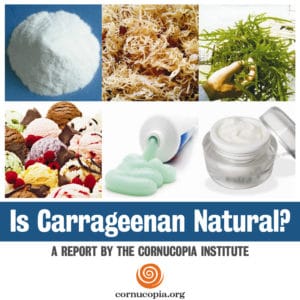This article includes excerpts from the report: Carrageenan: How a Natural Food Additive is Making Us Sick
 Carrageenan is a common food additive that is derived from specific types of red seaweeds, which are then processed with alkali. This processed substance is distributed widely and used as a “natural” food ingredient. It’s why you’ll find it listed as an ingredient in a number of natural and organic foods. But how natural is it really?
Carrageenan is a common food additive that is derived from specific types of red seaweeds, which are then processed with alkali. This processed substance is distributed widely and used as a “natural” food ingredient. It’s why you’ll find it listed as an ingredient in a number of natural and organic foods. But how natural is it really?
Carrageenan is found in all corners of our processed food industry. It serves as a substitute for fat, and to thicken nonfat or low-fat foods or dairy replacements. It recreates a fatty “mouthfeel” in products such as low-fat or nonfat dairy (e.g., low-fat cottage cheese, low-fat sour cream) and vegetable-based dairy substitutes (e.g., soymilk, coconut milk).
Carrageenan is used as a stabilizer for beverages that separate, and otherwise must be must be stirred or shaken before use to redistribute the particles. Addition of carrageenan allows beverages like chocolate milk or nutritional shakes to be consumed without first shaking or stirring. But with the serious health risks connected with carrageenan, shaking and stirring your food before consuming hardly seem like difficult tasks.
Carrageenan is also used in meats, especially deli meat and prepared chicken. It is sometimes injected as a brine in pre-cooked poultry to improve tenderness and maintain juiciness. It is added to low-sodium or low-fat deli meat (e.g. sliced turkey) as a binder. It is found in many processed foods, even some certified organic frozen pizzas and nutrition bars. And many varieties of canned pet food contain carrageenan as well.
Although carrageenan is derived from a natural substance, it’s important to keep in mind that not all natural substances are safe. Many species of plants and seaweed contain substances that are very potent, either as medicine or poison. Other “natural” materials with powerful effects on the human body include tobacco, poison ivy, and rhubarb leaves, which are poisonous. You wouldn’t rub poison ivy all over you just because it’s natural, right?
When processed with acid instead of alkali, carrageenan is degraded to a low molecular weight, and is called “degraded carrageenan” or poligeenan. In fact, degraded carrageenan is such a potent inflammatory agent that scientists routinely use it to induce inflammation and other disease in laboratory animals, so as to test anti-inflammation drugs and other pharmaceuticals on them.
Degraded carrageenan is not allowed in food, but scientists have raised concerns for decades that the use of foodgrade (undegraded) carrageenan also causes harm. A convincing body of scientific literature shows negative effects caused by food-grade carrageenan. Moreover, scientists are concerned that the acid environment of the stomach may even “degrade” foodgrade carrageenan on its own once it enters the digestive system, thus exposing the intestines to this potent and widely recognized carcinogen.
It’s been scientifically proven that carrageenan has a unique chemical structure that leads to prolonged inflammation and other negative health effects. Its effect on the body is similar to the effect of certain pathogenic bacteria such as Salmonella, which are also technically “natural.” The health impacts from consuming food-grade carrageenan are well documented in scientific literature dating back to the late 1960s. Researchers found a link between the type of carrageenan used in food to gastrointestinal disease in laboratory animals, including ulcerative colitis–like disease, intestinal lesions, and colon cancer.
In 1981, two researchers conducted a literature review of the science published since the late 1960s, and raised concerns about the widespread use of carrageenan in our food supply. The researchers wrote in the journal Cancer Detection and Prevention:
“[U]ndegraded carrageenan is still widely used throughout the world as a food additive. Its harmful effects in animals are almost certainly associated with its degradation during passage through the gastrointestinal tract. There is a need for extreme caution in the use of carrageenan or carrageenan-like products as food additives in our diet.”
Though carrageenan adds no nutritional value or flavor to foods or beverages, the food industry still uses it in a wide variety of applications where it’s not necessarily needed.
Researchers concerned with the effects of carrageenan in the diet have also used undegraded, food-grade carrageenanto investigate potentially harmful effects. When the carrageenan manufacturers’ trade group tested 12 samples of food-grade carrageenan, it found every sample was considered contaminated with degraded carrageenan (classified as a “possible human carcinogen”) by at least one of the testing laboratories.
Food processors have an ethical obligation to their customers to take these test results seriously. Their claims that food-grade carrageenan is safe cannot be backed by recent scientific studies and other test results.
So the question at this point still is whether or not carrageenan is “natural.” Do we define natural as anything occurring in nature—which would in essence be everything on the planet—or do we define it as minimally or completely unprocessed? What about safe? Should natural mean safe?
While those are questions still to be answered, what we do know is this: It certainly seems unnatural to add harmful ingredients to our food no matter where they come from originally.
Read the full report and check out Cornucopia’s carrageenan shopping guide to find alternative products that are carrageenan-free.
The post Is Carrageenan Natural? appeared first on Cornucopia Institute.
